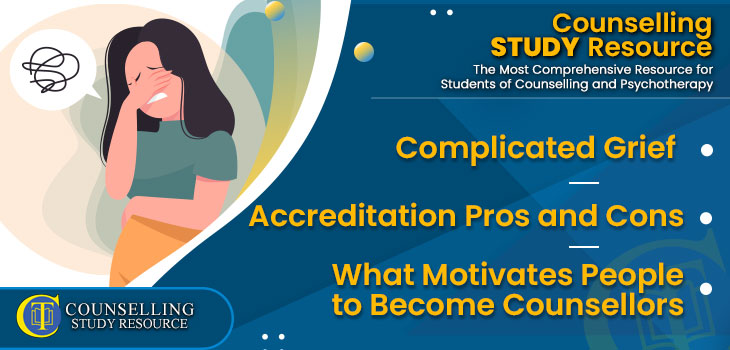279 – Complicated Grief
Accreditation Pros and Cons – What Motivates People to Become Counsellors
In Episode 279 of the Counselling Tutor Podcast, your hosts Rory Lees-Oakes and Ken Kelly are back with this week’s three topics:
- Firstly in ‘Student Services’, we look at recognising complicated grief.
- Then in ‘Ethical, Sustainable Practice’, should you consider becoming accredited?
- And lastly in ‘Practice Matters’, Rory speaks with counselling student Sinead Oskun about her ‘why’.
Complicated Grief [starts at 02:39 mins]
Counselling Foundations is sponsored by
Counselling Skills Academy
Learn counselling techniques by seeing counselling skills used in real sessions by qualified therapists.
Real sessions - real-life presentations - real skills.
As a student on placement, if you recognise complicated grief, you will be expected to refer that client. In this section, Rory and Ken identify some of the differences between ordinary grief and complicated grief:
- Complicated grief is a long grief.
- It is usually worked on with very specific practitioners.
- It can be linked with depression.
- It is intense, long lasting, and affects the client’s everyday life.
- The client could be described as ‘stuck’ in their grief.
- Sometimes complicated grief can come about due to sudden/traumatic loss.
- The client might have lost someone that they were currently in a disagreement with, preventing them from gaining closure or resulting in them dealing with feelings of guilt.
- A lack of future vision without the person they’ve lost, not being able to imagine a life without them.
- Unable to carry out their daily tasks.
- If you think you have identified complicated grief within a client, take this to your supervisor so you can look into suitable referrals.
A handout on Complicated Grief is available for download in the green button above.
Accreditation Pros and Cons [starts at 19:19 mins]
In this section, Rory and Ken discuss some of the pros and cons of becoming an accredited counsellor, and things to consider when making your own decision:
- Getting accredited isn’t necessary, you will still be a qualified counsellor without it.
- When becoming accredited you will submit a piece of work that has to pass, proving that you are of a certain standard.
- This costs a fee.
- To work for some organisations, such as the NHS, you might be expected to become accredited.
- It acknowledges your experience and ongoing commitment.
- It is by no means necessary, and does not invalidate your skills as a qualified counsellor.
- Do whatever suits you best.
- It is rare that a client will ask if you are accredited.
What Motivates People to Become Counsellors [starts at 34:44 mins]
The National Counselling Society is proud to sponsor Practice Matters.
NCS are really excited to have launched their Children and Young People Therapist Register for counsellors working with the younger age group.
In this week’s ‘Practice Matters’, Rory speaks with counselling student Sinead Oskun about her journey and motivations to become a counsellor. Today, this section of the podcast briefly mentions child bereavement.
The key points of this discussion include:
- It’s important to have a strong ‘why’ behind your counselling studies.
- What is your motivation?
- During your journey, do what is best for you and stick to your personal values.
- If you can, volunteer in areas that are meaningful to you. This will allow you to fully invest yourself.
- Keep close to your ‘why’.
- Partake in your own therapy.
- Balance your well being with your professional development.
- What is going to give you the biggest sense of fulfillment?
- Follow a route that is best for you.


